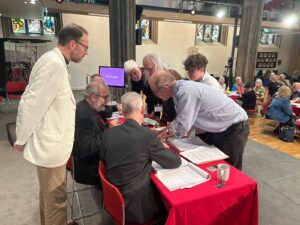On the final day of General Synod 2024 at St Paul’s & St George’s Episcopal Church in Edinburgh, business was dominated by debate over Israel-Palestine.
A Rule 10 motion, brought to Synod in the week before the annual gathering, had been accepted as part of the Synod agenda at a preliminary vote on Friday.
The motion, proposed by the Rev Canon Dr Nicholas Taylor, Diocese of Glasgow & Galloway, and seconded by the Rev Canon Dr James Currall, Diocese of Moray, Ross & Caithness, stated that the Synod:
Welcome and affirm the recent statement of the College of Bishops calling for a ceasefire in Gaza and a just peace in Israel-Palestine, and the nomination of Friends of the Holy Land as recipient of the Synod Offering;
Call upon the College of Bishops to continue to speak boldly in the name of this Church on matters of justice and human rights;
Express its solidarity with the Diocese of Jerusalem and the Middle East, and other Christian communities in Palestine-Israel;
Call upon the Ethical Investment Advisory Group [EIAG] to formulate guidelines to assist all bodies in this Church to ensure that they in no way benefit from the exploitation, oppression, and dispossession of the Palestinian people.
Debate immediately centred around clause four of the motion, with the Rev Amanda Fairclough, Diocese of Argyll & The Isles, tabling an amendment that the clause be deleted from the motion.
Ms Fairclough, a member of the Investment Committee, said: “I stand with Nicolas and James and all those who signed the [Rule 10] petition, to say I want peace. I do not want innocents – men, women and children – to be killed.
“But as the motion is formed I cannot in all conscience vote for it. Clauses one to three are admirably non-partisan. When we come to clause four, there is a dissonance. It doesn’t follow naturally, and it introduces a partiality whether it intends to or not.
“The Ethical Investment Advisory Group are already thinking this. We are already working it through. We are already losing sleep over it.
“Remove clause four and you will allow me and I suspect others to stand fully behind the motion.”
Bishop Andrew Swift, Diocese of Brechin and convener of the EIAG, said that he appreciated the sentiment of the amendment but did not feel the need to remove clause four. “I am comfortable with it,” said Bishop Andrew. “We [the EIAG] have already begun a conversation about Israel/Palestine. The motion as it stands sends a strong public message and the EIAG can stand that.”
David Stevenson, Diocese of Edinburgh, then pointed out that the wording of cluse four could be interpreted in a variety of ways which might not be immediately obvious to those who vote for it.
The Very Rev Kelvin Holdsworth, Diocese of Glasgow & Galloway echoed the points made by Ms Fairclough, stating that he would not be able to support the motion if clause four remained in place.
“I am hugely encouraged by what Bishop Andrew says, that a conversation is on-going. But our interfaith partners’ voices are not present here.
“I do support the motion, but with clause four in there I can’t support the motion as I want to.”
The amendment was carried, before Synod adjourned briefly ahead of considering the abbreviated motion.
Upon return, the Rev Bonnie Evans-Hills, Diocese of St Andrews, Dunkeld & Dunblane, said that she instinctively wanted to support the motion, and that she welcomed the recent College statement, but she was disappointed as convener of the Interfaith Relations Committee that the committee did not know this motion was going to be debated until arrival at General Synod.
The Rev David Paton-Williams, Dicoese of Edinburgh, welcomed the statement but felt it did not go far enough. “In the context of 40,000 deaths it seems anaemic,” said Mr Paton-Williams, “and although I will probably vote for it but feel it is a missed opportunity to record our profound grief and horror.”
Victoria Elliott, Diocese of Edinburgh, agreed with Mr Paton-Williams, and a further amendment was then put to Synod to expand clause three to read that this Synod “express its solidarity with the Diocese of Jerusalem and the Middle East, and other Christian communities in Palestine-Israel; and its profound grief and horror at all the violence and suffering experienced by people in Israel-Palestine over many years.”
The proposers accepted the amendment and Synod members approved the motion, to applause from the floor.
The Saturday morning session had begun with Synod voting for a series of motions brought by the Safeguarding Committee, including revision of Canon 65, before the Standing Committee motion to approve a quota figure of £750,000 for 2025 was approved.
The day’s business ended with elections, and the following appointments were approved:
Rev Diana Hall to Standing Committee; Dr Ros Brett to the Institute Council; Ms Jan Whiteside as Convener of the Administration Board; Mr Robert Dickson, Rev Deborah Davison and Rev Elizabeth Breakey to the Administration Board; Ms Yvonne Waugh as a practising lawyer member of the Preliminary Proceedings Committee (PPC); Professor Peter Sharp as lay member of the PPC; Ms Morag Hendry as alternate lay member of the PPC; Dr Jill Stoner and Mr Robert Dickson as lay members of the Clergy Discipline Tribunal; Very Rev Kenneth Rathband and Rev Canon Marion Chatterley as members of the Clergy Discipline Tribunal; and Mr Calum MacNeill KC, Ms Fiona Drysdale KC and Mr Mark Lindsay KC as practising lawyer members of the Clergy Discipline Tribunal.
The Primus then thanked all those who had been involved in the preparation and running of Synod, and in particular offered thanks to Mr John Stuart who sat at the top table for the last time as he prepares to retire at the end of 28 years as Secretary General. Synod again rose to applaud Mr Stuart, before the closing act of worship and confirmation of the Acts of Synod.

